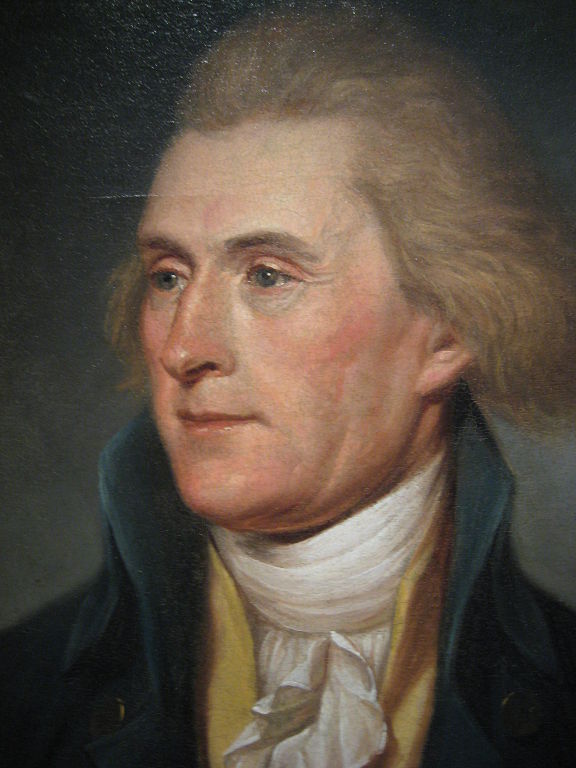Mr. Jefferson is quite passé these days, but ‘twas not always so. When I was a young lad, Mr. Jefferson was still firmly fixed among the America’s heroes, the great defender of the liberty of the states and the individual citizen, now not so much. Jefferson lost his luster among the members of the political Left over slavery, but perhaps more so because Mr. Jefferson really did believe in limited government and the Left does not. The crony capitalist Right has always been uncomfortable around Jefferson, and on matters economic and financial they have always attempted to portray Jefferson as a kook. To their credit they still make the pilgrimage up from Wall Street to Trinity Church to lay flowers on the grave of their man, who I imagine may be allowed to derive some comfort from the gesture as he lay roasting in the infernal regions. Some on the right of a more religious bent aim the arrows of their criticism at Jefferson’s embrace of the Enlightenment and godless atheism, or something darn near close to it. Yes, the “Jefferson as godless Jacobin” redux left over from the old days during the election of 1800 is still with us. It would be both too long and too tedious to hash through all the ink spilled by the Jefferson haters, and then to answer their criticism in detail. Some of this good work has already been done by other writers who post here; I would like to focus rather on the vision Jefferson had for his country—a vision every bit as American as the vision of Alexander Hamilton, and a good deal more just.
It is crucial, and therefore so often forgotten or ignored, that Jefferson’s primary identification was that of a planter. Today folks think that means a farmer with slaves, and indeed it may (or may not), but it means a great deal more than just this. A planter was one who planted civilization, and for Jefferson civilization rested upon the mighty foundation of a virtuous agrarian class. Jefferson’s farmers and planters were the “chosen people of people of God, if ever he had a chosen people whose breasts he has made his peculiar deposit for substantial and genuine virtue.” Jefferson believed that the tiller of the earth was far more immune to the corruptions of bribery and office seeking because he avoided the vice of dependency. No better people could be found for the republican experiment in self-government. Jefferson, though he was a part of the republic of letters, a man admired for his intellect and wide ranging interests on both sides of the Atlantic, and a statesman of the first rank, he always and everywhere identified himself as a planter. He was, in brief, a man not unlike his neighbors.
I imagine elites have always been ill at ease with Jefferson’s identification with the common man. He has been ridiculed as a hypocrite for this, as a man who took republican simplicity and humility a bit too far. But this too I think has been misunderstood. Jefferson loved the little communities of America, and what Edmund Burke described as the “little platoons of society.” Jefferson treasured their autonomy, their right to self-governance, and he honored and respected their long-standing traditions. In his own neighborhood, Jefferson was certainly the most prominent village deist, but he did not insist on an obnoxious display of unbelief among his neighbors—he remained a regular attendee at services throughout his life and was mostly reticent about expounding his own views on religion until the publication of his essay, “The Philosophy of Jesus.” Even then, Jefferson was careful, for he knew that he was “a sect by myself, as far as I know.” Some might view Jefferson’s religious stance as a type of patronizing hypocrisy, a species of rubbing elbows with farmer John at church on Sunday, but believing otherwise. One ought not to mistake good manners with hypocrisy, or with the consistent principle of Jefferson that he had no right to burden others with his peculiar views. In a word he was complex.
If one wishes to find a delightful irony in the work and thought of Jefferson, and I might add John Taylor of Caroline and John Randolph of Roanoke, it is this. There was much in the thought and vision of these men that pre dated the Enlightenment, French and Scottish, the Leveler Movement, the Reformation, and Machiavellian Moments of various stripes. The tenacity to which Jefferson and the Jeffersonians clung to the idea that the consolidation of political and economic power was a threat to the liberty of all would have warmed the heart of many a medieval king (yes I said king), burgher, noble, freeman, and schoolman. Jefferson, if he had received a proper education in the medieval world and not just the prejudices handed down from the early moderns and the philosophes, might have been shocked at the extent to which he, and say St. Thomas Aquinas, were in agreement on the composition of society. This is not to say that their differences were negligible; they were not. But we might recall that Jefferson, who drank deep from the wells of Whig theory, found the roots of republican society in the world of the Anglo-Saxons, pre-Norman invasion.
Whatever one may think of Mister Jefferson, his warnings about the danger of economic and political consolidation ring true. We are now at the mercy of government snoops, bankers, and financiers, and to quote the Sage of Monticello, “they ride us hard.” For myself, I’d much rather have a world where the Fourth Amendment was revered, foreign military adventures are non-existent, and capital, property and political power is widely diffused in the hands of private citizens. And where stock-jobbing, rent-seeking from the government and other forms of financial parasitism are despised and punished appropriately. An America, dear reader, much as Thomas Jefferson envisioned it.







